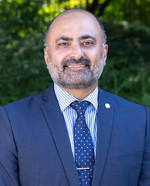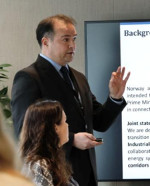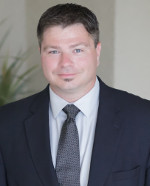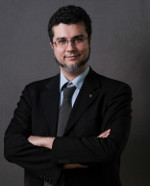IEEE Digital Privacy Workshop Organizing Committee
Gurvirender Tejay, Hofstra University
Hanan Hibshi, Carnegie Mellon University
Ümit Cali, University of York
Chris Gorog, Blockframe Inc.
Neeli Prasad
Stefano Zanero, Politecnico di Milano
Workshop Co-Chairs
 Dr. Gurvirender Tejay is an Associate Professor and Co-Director of Cybersecurity Research & Innovation Center at the Hofstra University. He is a seasoned expert in cybersecurity and digital privacy, with a research focus on insider threat detection, security governance, policy compliance, and the development of secure systems. Over his career, Dr. Tejay has secured more than $12 million in grant funding, including significant support from the U.S. National Security Agency and the Department of Labor, to advance cybersecurity education and workforce development. Dr. Tejay serves as the Editor-in-Chief of the ‘Organizational Cybersecurity Journal: Practice, Process and People’ with Emerald Publishing and is the Chair of Education and Training for the IEEE Digital Privacy Initiative. Dr. Tejay has also co-founded several non-profit organizations dedicated to fostering innovation and discourse in cybersecurity. He holds a Ph.D. in Information Systems from Virginia Commonwealth University, an M.S. in Computer Science from the University of Chicago, and an M.A. in Economics from the University of Wisconsin, Milwaukee.
Dr. Gurvirender Tejay is an Associate Professor and Co-Director of Cybersecurity Research & Innovation Center at the Hofstra University. He is a seasoned expert in cybersecurity and digital privacy, with a research focus on insider threat detection, security governance, policy compliance, and the development of secure systems. Over his career, Dr. Tejay has secured more than $12 million in grant funding, including significant support from the U.S. National Security Agency and the Department of Labor, to advance cybersecurity education and workforce development. Dr. Tejay serves as the Editor-in-Chief of the ‘Organizational Cybersecurity Journal: Practice, Process and People’ with Emerald Publishing and is the Chair of Education and Training for the IEEE Digital Privacy Initiative. Dr. Tejay has also co-founded several non-profit organizations dedicated to fostering innovation and discourse in cybersecurity. He holds a Ph.D. in Information Systems from Virginia Commonwealth University, an M.S. in Computer Science from the University of Chicago, and an M.A. in Economics from the University of Wisconsin, Milwaukee.
 Hanan Hibshi is an assistant teaching professor at the Information Networking Institute at Carnegie Mellon University, and one of the research investigators for the CMUS’ picoCTF educational platform. Hibshi’s research areas include usable security and privacy, cybersecurity education, security requirements, mobile and IoT Security, expert’s decision-making, and ML and AI for security and privacy.
Hanan Hibshi is an assistant teaching professor at the Information Networking Institute at Carnegie Mellon University, and one of the research investigators for the CMUS’ picoCTF educational platform. Hibshi’s research areas include usable security and privacy, cybersecurity education, security requirements, mobile and IoT Security, expert’s decision-making, and ML and AI for security and privacy.
Hibshi received a Ph.D. in societal computing from Carnegie Mellon University and an M.S. in information security technology and management from the Information Networking Institute at Carnegie Mellon University. Prior to her academic career, she had had some experience working in the banking industry.
Hibshi is interested in studying security experts; how to better train experts and how to develop intelligent tools that better accommodate their needs. One example of Hibshi’s research is her early research findings that had attracted the attention of an international, multi-institution collaboration with the University of Nottingham. Her work examined the intersection between security requirements risk assessment and empirical data-driven intelligent systems using fuzzy logic.
Hibshi has published in top venues, and she reviews research submissions at top security, privacy, and software engineering venues.
Workshop Committee Members
 Ümit Cali is a Professor of Digital Engineering for Future Technologies at the University of York, UK, and holds a part-time professorship in Energy Informatics at NTNU, Norway. With over 20 years of experience in industry and academia, his research spans legal tech, cyber-physical-social systems, energy systems, digital engineering, digital health, and energy informatics, integrating AI, blockchain, and digital twins. He holds a PhD in electrical engineering (renewable energy systems) and computer science (AI), and a Master of Laws (LL.M.) in IT and IP Law. Ümit has worked globally, including roles at IBM and Fraunhofer Institute, and co-founded high-tech startups. He has published over 180 articles, authored three books, and holds three US patents in blockchain. Ümit is actively involved with the IEEE community, serving as a Senior Member and holding several leadership positions, including Chair of the IEEE Energy and Blockchain Technical Community, Chair of the IEEE Digital Privacy (Energy) Sub-committee, and Vice-Chair of the IEEE Blockchain in Energy Standards Working Group (P2418.5).
Ümit Cali is a Professor of Digital Engineering for Future Technologies at the University of York, UK, and holds a part-time professorship in Energy Informatics at NTNU, Norway. With over 20 years of experience in industry and academia, his research spans legal tech, cyber-physical-social systems, energy systems, digital engineering, digital health, and energy informatics, integrating AI, blockchain, and digital twins. He holds a PhD in electrical engineering (renewable energy systems) and computer science (AI), and a Master of Laws (LL.M.) in IT and IP Law. Ümit has worked globally, including roles at IBM and Fraunhofer Institute, and co-founded high-tech startups. He has published over 180 articles, authored three books, and holds three US patents in blockchain. Ümit is actively involved with the IEEE community, serving as a Senior Member and holding several leadership positions, including Chair of the IEEE Energy and Blockchain Technical Community, Chair of the IEEE Digital Privacy (Energy) Sub-committee, and Vice-Chair of the IEEE Blockchain in Energy Standards Working Group (P2418.5).
 Chris Gorog, CEO BlockFrame Inc, Co-Chair IEEE Digital Privacy Initiative, Published Author, Multiple patent holder, Co-Founder of Blockchain Development Community, Founder of International Alliance of Trust Chains, Cybersecurity and Blockchain SME to the State of Colorado Legislator, the Host of the New Cyber Frontier Podcast, and Research Partner with Pacific Northwest National Laboratory, Arizona State University, University of Colorado, University of Denver, and Colorado State University.
Chris Gorog, CEO BlockFrame Inc, Co-Chair IEEE Digital Privacy Initiative, Published Author, Multiple patent holder, Co-Founder of Blockchain Development Community, Founder of International Alliance of Trust Chains, Cybersecurity and Blockchain SME to the State of Colorado Legislator, the Host of the New Cyber Frontier Podcast, and Research Partner with Pacific Northwest National Laboratory, Arizona State University, University of Colorado, University of Denver, and Colorado State University.
Dr. Gorog is a Certified Information Systems Security Professional with over 30 years in the cybersecurity design industry, a prior director of cybersecurity programs at Colorado Technical University, and program manager for Blockchain research at University of Colorado Colorado Springs. He is a graduate of the US Navy Nuclear Power Program, holds a Bachelor of Computer Engineering, Master of Business Administration, Master of Computer Science in Computer System Security from Colorado Technical University and PhD in Cybersecurity Engineering at University of Colorado at Colorado Springs. His work with distribution of trust for next generation security and privacy engages several community groups and international organizations in support of research for the State of Colorado to enable security and privacy for government programs.
 Stefano Zanero received a PhD in Computer Engineering from Politecnico di Milano, where he is currently an associate professor with the Dipartimento di Elettronica, Informazione e Bioingegneria. His research focuses on malware analysis, cyberphysical security, and cybersecurity in general. Besides teaching “Computer Security” and “Digital Forensics and Cybercrime” at Politecnico, he has an extensive speaking and training experience in Italy and abroad. He co-authored over 90 scientific papers and books. He is a Senior Member of the IEEE and sits in the Board of Governors of the IEEE Computer Society; he is a lifetime senior member of the ACM, which has named him a Distinguished Speaker; and has been named a Fellow of the ISSA (Information System Security Association). Stefano is also a co-founder and chairman of Secure Network, a leading cybersecurity assessment firm, and a co-founder of BankSealer, a startup in the FinTech sector that addresses fraud detection through machine learning techniques.
Stefano Zanero received a PhD in Computer Engineering from Politecnico di Milano, where he is currently an associate professor with the Dipartimento di Elettronica, Informazione e Bioingegneria. His research focuses on malware analysis, cyberphysical security, and cybersecurity in general. Besides teaching “Computer Security” and “Digital Forensics and Cybercrime” at Politecnico, he has an extensive speaking and training experience in Italy and abroad. He co-authored over 90 scientific papers and books. He is a Senior Member of the IEEE and sits in the Board of Governors of the IEEE Computer Society; he is a lifetime senior member of the ACM, which has named him a Distinguished Speaker; and has been named a Fellow of the ISSA (Information System Security Association). Stefano is also a co-founder and chairman of Secure Network, a leading cybersecurity assessment firm, and a co-founder of BankSealer, a startup in the FinTech sector that addresses fraud detection through machine learning techniques.

